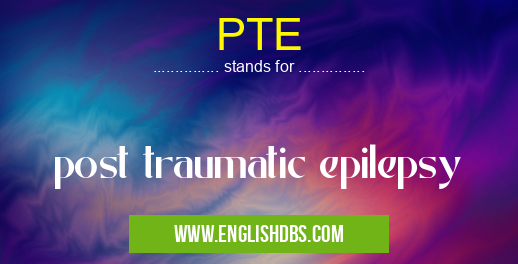What does PTE mean in BRITISH MEDICINE
Post-traumatic epilepsy (PTE) is a type of epilepsy that develops after suffering an injury to the head or brain. It is the result of a traumatic brain injury that triggers a seizure disorder, with symptoms ranging from temporary confusion to severe, recurrent seizures. PTE can affect people of any age but is most common in individuals who experience a severe head or brain trauma, such as those involved in motor vehicle or sporting accidents.

PTE meaning in British Medicine in Medical
PTE mostly used in an acronym British Medicine in Category Medical that means post traumatic epilepsy
Shorthand: PTE,
Full Form: post traumatic epilepsy
For more information of "post traumatic epilepsy", see the section below.
Symptoms
Symptoms of post- traumatic epilepsy may vary depending on how severe the initial trauma was and where it was sustained. Common signs and symptoms can include repetitive muscle jerking, loss of awareness and consciousness, confusion, disorientation, loss of balance and coordination as well as vision disturbances such as double vision or light sensitivity. Seizures can range in severity and some symptoms may be more pronounced than others depending on the individual's case.
Diagnosis
Diagnosis of post traumatic epilepsy typically involves a neurological exam by a doctor followed by EEG testing. This allows doctors to determine if there has been any damage to the brain that could indicate the presence of PTE. Doctors may also order imaging tests such as CT scans or MRI scans to further investigate any areas of potential damage within the brain.
Treatment
Treatment for PTE often centers around medications designed to reduce seizures and lessen their intensity when they occur. Anticonvulsant drugs are commonly prescribed for this condition, although some people find non-drug treatments like yoga or meditation helpful in reducing seizure frequency and intensity. In addition, lifestyle changes such as avoiding certain triggers like alcohol or flashing lights may be recommended in order to reduce the likelihood of seizures occurring.
Conclusions
Although post traumatic epilepsy can be serious condition with significant impacts on day-to-day life, appropriate medical management with medications along with lifestyle adjustments can help minimize its effects on an individual's wellbeing and quality of life.
Essential Questions and Answers on post traumatic epilepsy in "MEDICAL»BRITMEDICAL"
What is PTE?
Post traumatic epilepsy (PTE) is a type of seizure disorder caused by traumatic brain injury, such as a head injury, stroke, or other neurological condition. It usually begins within the first week after the initial injury and may persist over time.
Is PTE treatable?
Yes, PTE can be treated with medications that focus on controlling seizures. Many people also find relief in other therapies such as physical therapy and cognitive behavioral therapy.
How common is PTE?
Post traumatic epilepsy is relatively uncommon, affecting roughly 3%-8% of people with a history of traumatic brain injury or stroke.
What are the symptoms of post traumatic epilepsy?
The primary symptom of post traumatic epilepsy is recurrent seizures, but it can also cause memory problems, difficulty concentrating, irritability, fatigue and depression.
Can post-traumatic epilepsy lead to long-term complications?
Yes. In some cases, post-traumatic epilepsy can cause lasting changes in personality or behavior, although this is rare. Other potential complications include impaired judgment and coordination and increased risk of falls and fractures.
Are there any lifestyle modifications I should make if I have post-traumatic epilepsy?
People with post-traumatic epilepsy are advised to maintain a regular sleep schedule, avoid alcohol and drugs (including caffeine), get regular exercise to reduce stress, avoid bright lights and loud noises that could trigger a seizure, and wear protective headgear when doing activities like biking or skiing.
Is there any way to prevent post-traumatic epilepsy?
Unfortunately not; once you've suffered a trauma to your brain that triggers an episode of PTE there is no way to reverse the damage done to your neurological system. That said it's important for anyone suffering from severe head injuries to receive prompt medical attention so that symptoms can be caught early on for best results.
PTE also stands for: |
|
| All stands for PTE |
